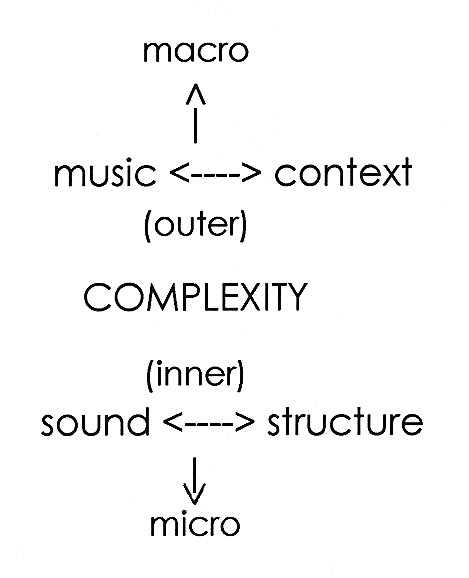________________________________________
"When ... man invented words and music he altered the soundscape and the soundscape altered man. The epigenetic evolution interacting progressively between humanity and his soundscape has been profound."
- Buckminster Fuller, "The Music of the New Life", Music Educators Journal, 52(6), 1966, p. 52.
"In this collection, he proved his mastery of the subtle colors, treacherous rhythms, and delicate contrapuntal lines that fashioned Debussy's impressionistic soundscapes."
- Time Magazine, Oct. 1968.
"One of the purposes of this booklet is to direct the ear of the listener towards the new soundscape of contemporary life, to acquaint him with a vocabulary of sounds he may expect to hear both inside and outside concert halls."
- R. Murray Schafer, The New Soundscape (A Handbook for the Modern Music Teacher), Berandol Music, 1969.
"Music is sounds, sounds heard around us whether we're in or out of concert halls: cf. Thoreau" - John Cage, quoted in Schafer, 1969.
"The soundscape, which we define as the relationship of man and sonic environments of any kind ... any analysis of it will be based not only on physical parameters, but rather on what may be called perceptual and cognitive primitives ..."
- Barry Truax, "Soundscape Studies: An Introduction to the World Soundscape Project," Numus West, no. 5, 1974.
Soundscape Definition (Handbook for Acoustic Ecology, 1978)
The term is also widely used commercially, for instance as a store name, outdoor speaker, electronic gear, background music, a game or a doll!
_____________________________________________
Critiques
Ari Kelman, "Rethinking the Soundscape," Senses and Society, 5(2), 2010, pp. 212-234
- in discussing Schafer's Tuning of the World: "The Soundscape is a prescriptive text that is often referred to as a descriptive one." (the polarization of "lo-fi" urban vs the "hi-fi" natural)
- scholars using the term generically, e.g. Fiona Richards, The Soundscapes of Australia; Charles Hirschkind, The Ethical Soundscape; John Picker's Victorian Soundscapes
- scholars re-defining the term, e.g. ethnomusicologist Kay Kaufman Shelemay’s Soundscapes (understanding music in context, fluid like a seascape); Truax's Acoustic Communication (re-defining and "limiting" the term to communication); Emily Thompson's The Soundscape of Modernity (evolving sound in early 20th century)
___________________________________________
Tim Ingold, "Against Soundscape," in A. Carlyle, ed., Autumn Leaves, Double Entendre, Paris, 2007.
- "a landscape may be audible, but to be aural it would have to have been first rendered by a technique of sound art or recording, such that it can be played back within an environment ... in which we are otherwise deprived of sensory stimulus"
-"It is of course to light, and not to vision, that sound should be compared. ... Sound ... is neither mental nor material, but a phenomenon of experience - that is, of our immersion in, and commingling with, the world..."
- "listening to our surroundings, we do not hear a soundscape. For sound ... is not the object but the medium of our perception. It is what we hear in."
- puts the emphasis on embodiment, emplacement, and being "ensounded" (and compares the flux of sound to wind)
Moving "beyond" Soundscape
Sound studies: Jonathan Sterne emphasizes its interdisciplinarity, need for reflexivity, historicity, and criticality (preface to the Sound Studies Reader)
Acoustemology: Steven Feld, "one’s sonic way of knowing and being in the world"; "as place is sensed, senses are placed; as places make senses, senses make place," in D. Howes, ed. Empire of the Senses: The Sensual Culture Reader, 2005.
Acoustic Communication: An information based model
World Forum for Acoustic Ecology: website and listserve
ISO Working Group 54:
Soundscape: acoustic environment as perceived or experienced and/or understood by people, in context.
Acoustic environment: sound from all sound sources as modified by the environment. (Acoustic environment can be actual or simulated, outdoor or indoor, as experienced or in memory. )Soundscape Composition: context-based composition; extending from real-world to virtual soundscapes (e.g. Chalice Well)
Sonification/Audification <------------> Phonography
Real world data mapped onto / interpreted as sound
science in the service of art - or - art in the service of science?
Sound sculpture / installation activated by the real world
Re-mapping sound from the real world ----> virtual worlds
Representing The Real
(Soundscape Composition)
Phonography <------------> Imaginary worlds
Drever: representation of what? how and for whom? Ethnography vs sonic tourism
Wagstaff (TESE project): participant involvement
Feld: Acoustemology
Westerkamp: acoustic ecology, environmental activism and sustainability
Krause: niche hypothesis
Acoustic Ecology
Real-world Contexts
Soundscape
Abstracted
Abstract
Sound Object
Musical or Acousmatic Context
Microsound
______________________________________________________________
